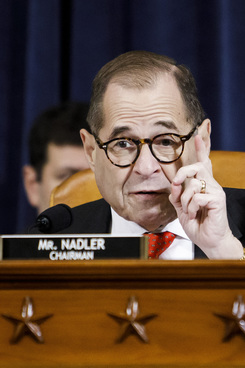Congress Can't Limit Trump's Pardon Powers. That Hurts Democrats Who Want to Investigate Stone's Commutation.
The Supreme Court's recent ruling tying congressional subpoenas to legislation is certain to be a hurdle for House Democrats who want to investigate the Stone commutation, as Congress can't pass bills on pardon powers.
July 17, 2020 at 04:49 PM
6 minute read
 Former Trump adviser Roger Stone. (Photo: Diego M. Radzinschi/ALM)
Former Trump adviser Roger Stone. (Photo: Diego M. Radzinschi/ALM)
Democrats vowing to investigate President Donald Trump's commutation of Roger Stone's prison sentence will face significant constitutional hurdles, especially after a Supreme Court ruling on the limits of congressional subpoenas, according to former House lawyers.
House Judiciary Committee Chair Jerry Nadler and House Oversight Committee Chair Carolyn Maloney said in a joint statement after Stone's commutation that they want White House counsel Pat Cipollone to brief them on the grant of clemency. Nadler added that his committee "will conduct an aggressive investigation into this brazen corruption."
Speaker Nancy Pelosi also called for legislation to prevent a president from issuing a grant of clemency to "an individual who is engaged in a cover-up campaign to shield that president from criminal prosecution."
On Friday, after this story was originally published, Nadler announced his committee would consider two pieces of legislation in response to Stone's commutation: One to require transparency on acts of clemency, and another that would, while the president is in office, stop the clock on the statute of limitations for crimes he may have committed.
"President Trump and his friend Roger Stone did what they said they would do. Stone misled federal investigators, intimidated a witness, and was convicted for obstruction of justice—but would not testify to the president's wrongdoing. In exchange, President Trump made sure that Stone will never spend a day in prison," Nadler said in a statement. "This quid pro quo is unacceptable. Congress must act."
But former congressional attorneys say, barring a possible constitutional amendment, Congress cannot place limits on pardons. That power is granted explicitly to the president under Article II. And without potential legislation behind an investigation, the House faces an uphill battle in trying to conduct the probe.
 House Judiciary Committee Chairman Jerry Nadler.
House Judiciary Committee Chairman Jerry Nadler.As Chief Justice John Roberts wrote in the U.S. Court's recent decision on congressional subpoenas for Trump's tax records, Congress's investigatory "power is 'justified solely as an adjunct to the legislative process,'" and "is subject to several limitations."
"Most importantly, a congressional subpoena is valid only if it is 'related to, and in furtherance of, a legitimate task of the Congress.' The subpoena must serve a 'valid legislative purpose,' it must 'concern[] a subject on which legislation "could be had,"'" Roberts wrote.
Thomas Spulak, a former House general counsel and partner at King & Spalding, said in an email that Congress is "unable to place any limits on the president's authority to commute sentences and issue pardons."
Spulak also said he believes lawmakers wouldn't be able to glean more details on Trump's decision-making in handing down the commutation, including those he discussed it with, under executive privilege protections granted to the president's deliberative processes. "So I believe in this case, the president would have a valid privilege to use to refuse to cooperate, which would also extend to subordinates," he said.
That means the House will not be able to point to potential legislation reforming pardon powers if they choose to launch a formal investigation on the Stone commutation.
Stanley Brand, a former House general counsel, pointed to Congress's attempt to investigate pardons handed down by former President Bill Clinton, including ones issued on Clinton's final day in office to financier Marc Rich and his business partner Pincus Green, which were criticized by both Democrats and Republicans. Clinton issued dozens of other grants of clemency on the last day of his term, which he later defended in a New York Times opinion piece.
Committees in both the House and the Senate held hearings on the pardons, featuring testimony from the Justice Department's pardon attorney at the time, career official Roger Adams. The U.S. Attorney for the Southern District of New York, Mary Jo White, was also reported to launched a criminal investigation into the matter, but no indictments emerged.
Lawmakers at the time were warned by legal scholars against altering the pardon powers through a constitutional amendment. However, considering such a constitutional amendment would open the door for issuing such subpoenas.
Brand, who believes the hearings on the Clinton pardons were unconstitutional, said the committee could invoke its oversight of the Justice Department to examine the pardons from that angle, but questioned the effectiveness of the approach. He said House Democrats could also eye outside actors who may have been involved in the process, like figures who lobbied for Stone's clemency.
"I guess they could go there, but I don't think the claims would be stronger for those people," Brand said, noting that any issued subpoenas would still have to be based on relevant legislation.
Spulak also said lawmakers "could identify areas that on their face could appear to lie outside of the decision-making process to try to get at what went on."
"But in the end, in this case, the president might well have the better constitutional arguments. But that doesn't mean they shouldn't try," he added.
Another pathway for the House is its appropriations power. Nadler has already introduced legislation to cut $50 million from the Justice Department's budget, in response to what he and other Democrats describe as increased politicization at the agency under Attorney General William Barr.
Gillian Metzger, a constitutional law scholar with Columbia Law School, pointed to the House's power of the purse as potentially playing a role in the response to the Stone commutation.
"Even accepting—it's debatable—that Congress cannot zero out funding for core presidential authorities like the pardon power, Congress still has substantial discretion over how much to fund and information about how the president is using the pardon power would seem relevant to appropriations legislation Congress might enact," Metzger said.
Barr is also set to appear before the House Judiciary Committee on July 28, where he is certain to face questions about the Stone commutation.
This content has been archived. It is available through our partners, LexisNexis® and Bloomberg Law.
To view this content, please continue to their sites.
Not a Lexis Subscriber?
Subscribe Now
Not a Bloomberg Law Subscriber?
Subscribe Now
NOT FOR REPRINT
© 2025 ALM Global, LLC, All Rights Reserved. Request academic re-use from www.copyright.com. All other uses, submit a request to [email protected]. For more information visit Asset & Logo Licensing.
You Might Like
View All
GOP Now Holds FTC Gavel, but Dems Signal They'll Be a Rowdy Minority
6 minute read
Fired by Trump, EEOC's First Blind GC Lands at Nonprofit Targeting Abuses of Power
3 minute read
Latham Adds Former Treasury Department Lawyer for Cross-Border Deal Guidance
2 minute read
'Erroneous Rulings'?: Wilmer Asks 4th Circuit to Overturn Mosby's Criminal Convictions
3 minute readLaw Firms Mentioned
Trending Stories
- 1Public Notices/Calendars
- 2Wednesday Newspaper
- 3Decision of the Day: Qui Tam Relators Do Not Plausibly Claim Firm Avoided Tax Obligations Through Visa Applications, Circuit Finds
- 4Judicial Ethics Opinion 24-116
- 5Big Law Firms Sheppard Mullin, Morgan Lewis and Baker Botts Add Partners in Houston
Who Got The Work
J. Brugh Lower of Gibbons has entered an appearance for industrial equipment supplier Devco Corporation in a pending trademark infringement lawsuit. The suit, accusing the defendant of selling knock-off Graco products, was filed Dec. 18 in New Jersey District Court by Rivkin Radler on behalf of Graco Inc. and Graco Minnesota. The case, assigned to U.S. District Judge Zahid N. Quraishi, is 3:24-cv-11294, Graco Inc. et al v. Devco Corporation.
Who Got The Work
Rebecca Maller-Stein and Kent A. Yalowitz of Arnold & Porter Kaye Scholer have entered their appearances for Hanaco Venture Capital and its executives, Lior Prosor and David Frankel, in a pending securities lawsuit. The action, filed on Dec. 24 in New York Southern District Court by Zell, Aron & Co. on behalf of Goldeneye Advisors, accuses the defendants of negligently and fraudulently managing the plaintiff's $1 million investment. The case, assigned to U.S. District Judge Vernon S. Broderick, is 1:24-cv-09918, Goldeneye Advisors, LLC v. Hanaco Venture Capital, Ltd. et al.
Who Got The Work
Attorneys from A&O Shearman has stepped in as defense counsel for Toronto-Dominion Bank and other defendants in a pending securities class action. The suit, filed Dec. 11 in New York Southern District Court by Bleichmar Fonti & Auld, accuses the defendants of concealing the bank's 'pervasive' deficiencies in regards to its compliance with the Bank Secrecy Act and the quality of its anti-money laundering controls. The case, assigned to U.S. District Judge Arun Subramanian, is 1:24-cv-09445, Gonzalez v. The Toronto-Dominion Bank et al.
Who Got The Work
Crown Castle International, a Pennsylvania company providing shared communications infrastructure, has turned to Luke D. Wolf of Gordon Rees Scully Mansukhani to fend off a pending breach-of-contract lawsuit. The court action, filed Nov. 25 in Michigan Eastern District Court by Hooper Hathaway PC on behalf of The Town Residences LLC, accuses Crown Castle of failing to transfer approximately $30,000 in utility payments from T-Mobile in breach of a roof-top lease and assignment agreement. The case, assigned to U.S. District Judge Susan K. Declercq, is 2:24-cv-13131, The Town Residences LLC v. T-Mobile US, Inc. et al.
Who Got The Work
Wilfred P. Coronato and Daniel M. Schwartz of McCarter & English have stepped in as defense counsel to Electrolux Home Products Inc. in a pending product liability lawsuit. The court action, filed Nov. 26 in New York Eastern District Court by Poulos Lopiccolo PC and Nagel Rice LLP on behalf of David Stern, alleges that the defendant's refrigerators’ drawers and shelving repeatedly break and fall apart within months after purchase. The case, assigned to U.S. District Judge Joan M. Azrack, is 2:24-cv-08204, Stern v. Electrolux Home Products, Inc.
Featured Firms
Law Offices of Gary Martin Hays & Associates, P.C.
(470) 294-1674
Law Offices of Mark E. Salomone
(857) 444-6468
Smith & Hassler
(713) 739-1250








